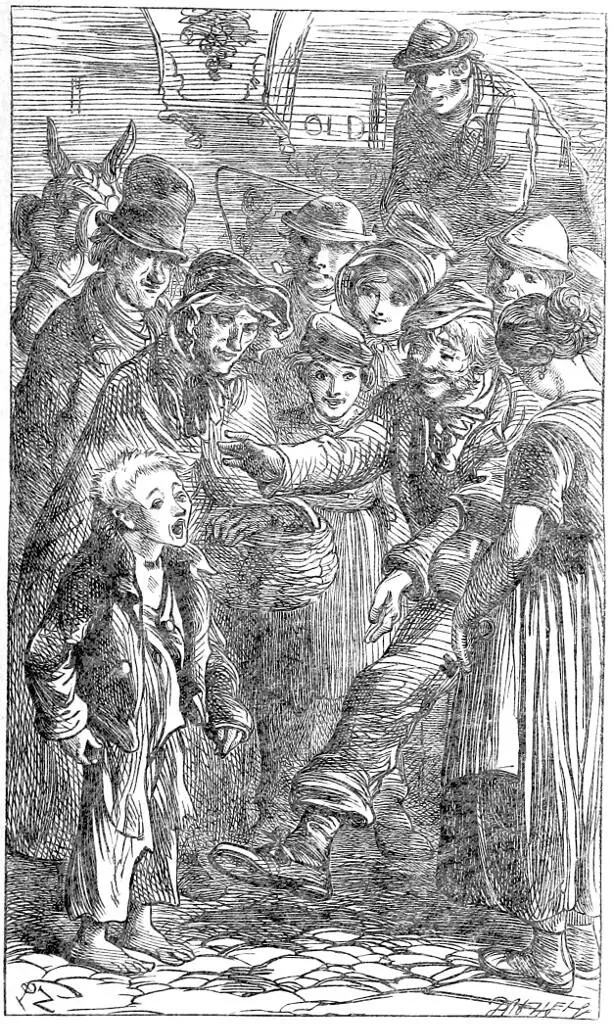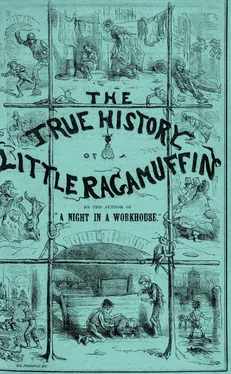A brewer’s dray, lumbering past, smashed the looking-glass in which I had seen the second boy so plainly reflected; but there was I, the original, with my eyes as wide open as ever, on the pavement. What was to hinder me? Why shouldn’t I step into the road and do as the other boy had done? What could be easier? It was quite an honest way of picking up a few halfpence, (my conversations with the Methodistic old Mrs. Dippie at the workhouse had made me think much more about honesty than of old—”as was instanced in that little affair of the pineapple,” may occur to the cynical reader; but consider, my dear sir, how hardly I was driven!) and there was not the humiliation of “cadging” about it. People were free to stop and listen, or pass on; they were free to listen and pass on afterwards, without paying their halfpenny, if they chose. I wasn’t a greedy and grasping boy; if only one in ten, ay, or in twenty, gave me a halfpenny, I would be satisfied. And without a moment’s further consideration over the matter I walked into the road, and after going a little way to get the song and the tune in order in my mind, I presently stood still and piped up.
It was at the corner of Liquorpond Street where I made my stand, and there was then, as there is now, at that spot, a public-house. When I first began the song I was disappointed to find that it attracted scarcely any attention. But this was easily accounted for. I thought that I had pluck enough for almost anything—for things twenty times more daring than singing a song in the street; and doubtless had it been simply singing a song in the street for my amusement, I could have accomplished it heartily enough, not caring a button who heard me. But now I did care who heard me, and that made all the difference! and, for the first time in my life, I discovered that I was possessed of the quality of bashfulness. I seemed to be afraid of the sound of my own voice; and when presently two little girls stopped to look at me and listen, I affected to be in fun, and made a grimace at them, (although my ears were tingling, and I could feel my face turning red,) and ceasing to sing, took to whistling, and to hopping on and off the pavement as though I was merely a boy out at play. At the same time I felt very much ashamed of my weakness, and screwed up my courage to the resolution that, as soon as the two girls were out of earshot, I really would strike up in earnest.

Erin-go-bregh
And so I did. I stood my ground firmly before the public-house window, and fixing my eyes intently on a placard in the window, concerning “old vatted rum,” began my song. First a boy stopped, but I did not flinch; then an old man and woman; then a servant-girl, with a beer jug in her hand. I thought to myself concerning this last one, “You are sent on an errand and ought to be in a hurry. If you stop and listen I should say that things looked promising.” She did stop. She didn’t stare at me as the old man and woman did, but she stood against the post, half turned from me, and I could see she was softly marking the time of the tune with her door-key against the beer jug. I was very much obliged to her—it would be difficult for me to explain how much. I turned away my gaze from the “old vatted rum” placard, and sang my song to her, my confidence increasing each moment.
Before I was half through with the second verse of “Erin-go-bragh,” my audience had increased to a dozen at least, exclusive of a man in a cart, who drew up just behind me. In less than a minute the dozen was increased to twenty, including three Irish bricklayers’ labourers, who came out of the public-house, and I wished that they had passed on, for they came and stood right between the servant-girl with the jug and myself, very much to my distress.
The song at an end, I raised my eyes, and to my great delight found three or four hands stretched out towards me, each one with a penny or a halfpenny in it, and gratefully enough I gathered them in. The heartiest hand of all, however, was one with nothing in it, and belonged to one of the Irish labourers before mentioned. It would be presumptuous, perhaps, to ascribe his behaviour entirely to the effects of my vocal talent; but it is a fact that that, acting on some previously imbibed influence, quite unmanned the poor fellow. His very legs bowed to the overwhelming power of his emotion, and he stepped staggeringly towards me, grasping my hand with a fervour that quite hurt my knuckles.
“Melia murther! but it does the heart of an Irishman good to hear that swate song. That’s Irish music, ye spalpeens!” continued he, turning to the people, “music as you don’t mate in this dirthy counthry ivery workin’ day in the week. Shure you couldn’t uv been payin’ dacent attintion to it, or you wouldn’t be so shparin’ av your dirthy coppers. Sing it agin, alanna! sing it agin, an’ its mesilf that’ll go round wid me hat at the ind of it.”
Three or four more halfpence was the result of my Irish friend’s exhortation, and the crowd—now quite a mob—laughed, and cried, “Sing it again, boy; sing it again.”
Nothing loth, I began the song again, the tipsy Irishman still holding my hand and steadying himself by it, wagging his head with his cap off as solemnly as though it were a hymn I was singing. This second performance was a tremendous success. True to his word, the Irishman went round with his cap, and presented me with a big handful of coppers out of it. Just, however, as I had pocketed the money, and was turning about anxious to escape from the crowd, a hand was placed on my shoulder, and a woman’s voice addressed me.
“What! is it you, little Jimmy? Goodness gracious, child! What on earth do you mean by it?”
There was only one woman in the world whose voice I dreaded, and this was not that one. It was a kind voice, and one with which I was familiar. It was Martha’s voice—Martha, Mrs. Winkship’s niece, whom the reader may remember my having made mention of.
Chapter XXIV. In which I am beholden to an old friend for sumptuous fare, and flannel and frilled linen. There is a prospect of my becoming a chimney-sweep.
Next to Mrs. Winkship herself, there was nobody for whom I entertained so much respect as for her niece, Martha.
She was, as I think I have before mentioned, an extremely plain young woman—so much so, indeed, that, standing as well as she did with her aunt, who was an influential person, and able to set up any matrimonially-disposed and likely young costermonger handsomely in business, no one thought it worth his while to pay his addresses to her. Whether this was lucky or unlucky for Martha, is impossible for anyone to say; it was not much to be wondered at, however. She was not even called by her proper and womanly name, but by an appellation suggested by her cruel visual deprivation, “Boss-eye!” By this name she was spoken of and spoken to. When a costermonger came to hire a barrow, he said, civilly enough, “Give us the key of the shed, please, Boss-eye.” If he was more than commonly intimate with her, he further nicked the nickname and called her “Bossy.” I believe she was no more regarded as an eligible object to make love to than the cast-iron face that formed part of Mrs. Winkship’s door-knocker. I don’t believe that she ever expected to be made love to. She found quite enough to occupy her mind in keeping the barrow-books, and marketing and cooking for Mrs. Winkship. She was a kind-hearted creature, however, and always pleasant.
She always had a kind word for me, and many and many a time, in the old starvation days at home with my stepmother, something more substantial; and it is one among the few gratifying recollections of my childhood that I never called her Boss-eye. Mrs. Winkship invariably addressed her as Martha, and, proud to follow so good a woman’s example, I called her Martha as well. I was the only boy in Fryingpan Alley who did so, which may in some degree account for her marked partiality to me.
Читать дальше












